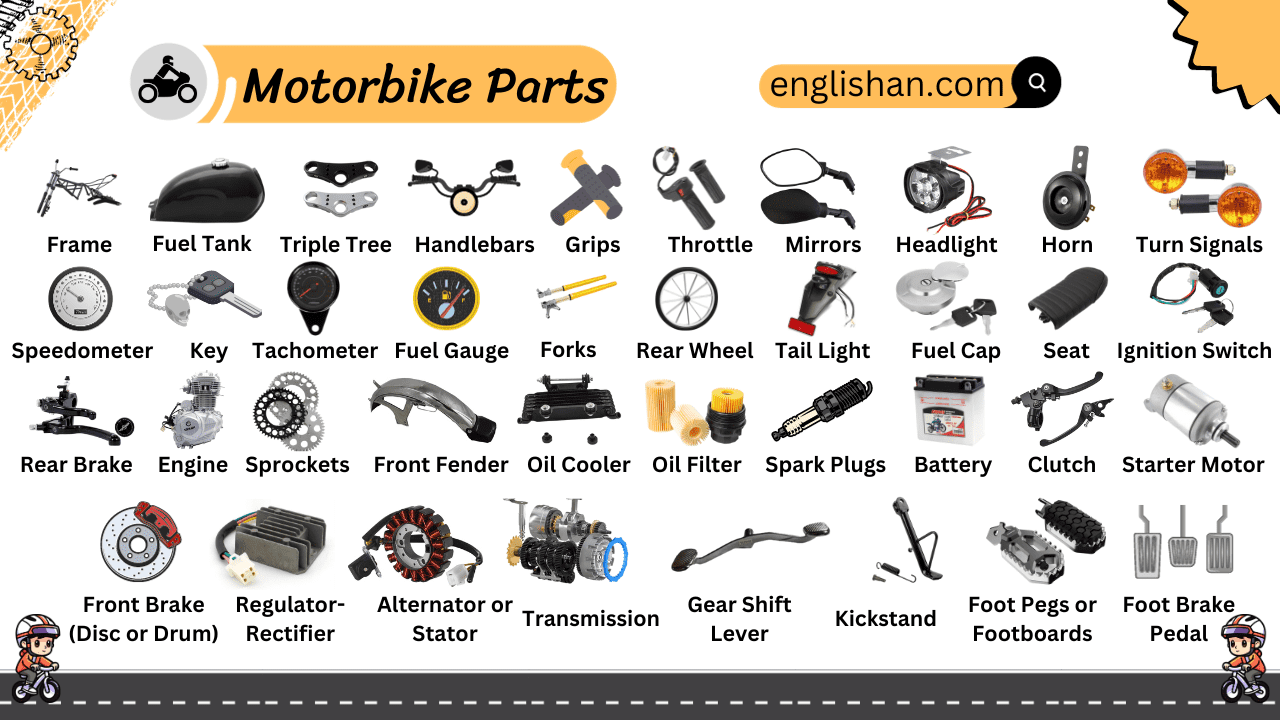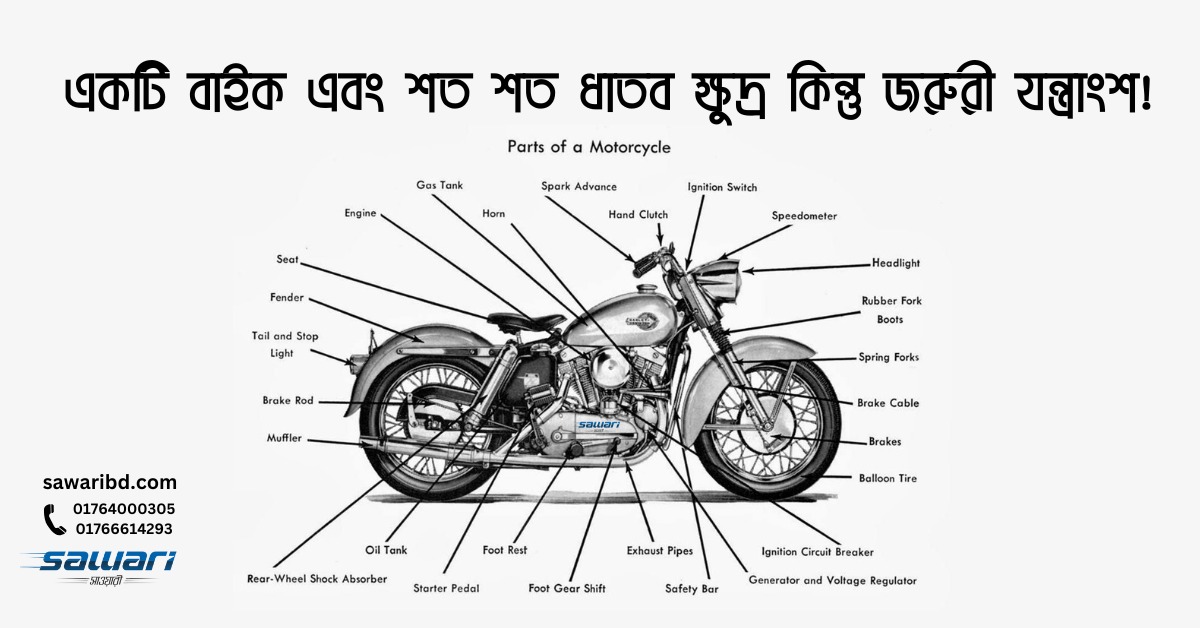Upgrade Strategies Using Aftermarket-Compatible Motorbike Components NZ
Upgrade Strategies Using Aftermarket-Compatible Motorbike Components NZ
Blog Article
Discover the Necessary MotorBike Parts You Required for Optimal Performance
Recognizing the vital parts of a motorbike is essential for attaining peak performance. Each component, from the engine to the stopping system, plays an important role in general performance and safety and security. Normal maintenance can prevent unforeseen failures and boost the riding experience. However, several motorcyclists overlook the complexities of these systems. Uncovering exactly how they function with each other can result in a much more effective experience. What vital parts should every motorcyclist prioritize?
The Engine: The Heart of Your Motorbike
The engine acts as the core component of a motorcycle, driving its performance and specifying its capabilities. It is accountable for converting fuel into power, which powers the bike onward. Different sorts of engines are used, consisting of single-cylinder, V-twin, and inline arrangements, each offering distinctive qualities matched for different riding purposes and designs. The engine dimension, typically measured in cubic centimeters (cc), considerably affects performance, with bigger engines usually giving more power and torque.Furthermore, the engine's design and technology, such as gas injection systems or air-cooling versus liquid-cooling, impact performance and integrity. Upkeep is important for peak procedure; variables like routine oil changes and monitoring stimulate plugs warranty durability. Motorcyclists frequently think about an engine's responsiveness and level of smoothness, as these features improve the general riding experience. Eventually, the engine stays a vital aspect that specifies not only the motorbike's efficiency but additionally the motorcyclist's link to the maker.
The Transmission: Shifting Gears Smoothly
The transmission plays a necessary role in a motorbike's performance, specifically in the auto mechanics of equipment moving. Comprehending how to shift equipments smoothly can boost the overall riding experience, while routine upkeep guarantees peak capability. Appropriate attention to these elements can significantly influence the long life and performance of the bike.

Equipment Shifting Mechanics
Smooth gear shifting is essential for suitable motorcycle efficiency, significantly influencing both velocity and control. The technicians of gear changing entail the communication in between the clutch, equipment lever, and transmission system. When a biker engages the clutch, it disengages the engine from the transmission, permitting an equipment change without harming the elements. A well-timed launch of the clutch, incorporated with accurate motion of the equipment lever, assists in a smooth adjustment between gears. This process guarantees that the engine runs within its finest power band, boosting efficiency. Motorcycle Spares Christchurch. Furthermore, comprehending the gear ratios and their effect on rate and torque can assist bikers make educated selections during shifts, eventually adding to an extra delightful and responsive riding experience
Maintenance Tips Relevance
Regular maintenance plays an essential role in assuring that the transmission system operates effectively, enabling smooth equipment shifts. Consistently inspecting and altering the transmission fluid is vital, as old fluid can lead to boosted rubbing and wear. Additionally, examining the clutch for wear warranties peak involvement and disengagement, protecting against slippage throughout equipment changes. Lubrication of moving parts is equally important to decrease friction and enhance performance. Bike owners ought to likewise monitor for leaks and uncommon noises, as these can indicate underlying concerns. By adhering to these maintenance tips, bikers can extend the lifespan of their transmission system, guaranteeing that equipment shifts stay smooth and adding to the total performance of their motorbike.
The Braking System: Ensuring Security on Every Trip
Braking systems are fundamental components that straight affect a motorbike's safety and performance. They contain numerous components, consisting of brake pads, rotors, calipers, and hydraulic lines, all collaborating to assure reliable deceleration. The type of braking system-- usually either disc or drum-- influences responsiveness and stopping power.Regular maintenance is vital to maintain peak efficiency; worn brake pads can result in lowered efficiency and boosted stopping ranges. Additionally, the high quality of brake fluid ought to be checked, as it can absorb dampness in time, jeopardizing stopping efficiency.Riders need to also take into consideration the relevance of anti-lock braking systems (ABS), which stop wheel lockup during abrupt quits, boosting overall safety. Appropriately operating brakes are not practically quiting; they impart self-confidence in the rider, enabling for more secure navigating with various terrains. Eventually, a reputable stopping system is important for delighting in every adventure with assurance.
The Suspension: Enhancing Convenience and Control
A well-functioning suspension system substantially contributes to a motorbike's general performance, complementing the efficiency of the stopping system. The suspension plays a substantial duty in taking in shocks from unequal surface areas, assuring a smoother experience while preserving tire call with the road. This call is vital for both stability and control, permitting cyclists to navigate edges with self-confidence and precision.Different kinds of suspension systems, such as telescopic forks or mono-shocks, next supply differing levels of comfort and handling. Properly tuned suspension boosts responsiveness, giving the biker with an extra connected feeling to the motorcycle. Normal upkeep checks are necessary to identify the suspension components, including springtimes and dampers, are working at their best. An effective suspension system not only raises the riding experience however additionally adds to the longevity of various other motorbike components by reducing deterioration. Consequently, purchasing quality suspension is essential for any type of serious motorbike enthusiast.
The Tires: Connecting You to the Roadway
Tires play an important role in a motorbike's efficiency, acting as the primary web link in between the roadway and the cyclist. Comprehending the different kinds of tires offered can significantly impact handling and safety. Furthermore, normal upkeep is vital to guarantee peak tire performance and durability.
Tire Keys In Explained
Just how do various tire types influence a motorbike's efficiency? Tire kinds play a crucial function in determining a motorcycle's hold, stability, and handling. Sport tires, made for high efficiency, deal enhanced grip and responsiveness on paved roads, making them ideal for competing and hostile riding. Conversely, exploring tires prioritize toughness and comfort, supplying a smoother adventure for long-distance traveling. Off-road tires, defined by their rugged step patterns, stand out in traction on unpaved surfaces, suitable for journey fanatics. Furthermore, dual-sport tires blend qualities from both off-road and on-road categories, accommodating functional riding needs. Eventually, selecting the right tire type is vital for optimizing efficiency, making more info here sure safety, and enhancing the general riding experience.
Upkeep Tips Offered
While riding on the road, keeping ideal tire condition is essential for safety and performance. Frequently examining tire pressure is essential, as under-inflated tires can bring about inadequate handling and enhanced wear. It is suggested to check tread deepness frequently; used tires concession grasp and security. Furthermore, motorcyclists must search for signs of damage, such as lumps or splits, which can indicate the demand for substitute. Rotating tires regularly assures even wear, boosting long life. Maintaining tires clean from particles and preventing extreme curbs can lengthen their lifespan. Finally, preserving proper alignment and balance adds to peak performance, decreasing stress and anxiety on various other bike parts. Complying with these upkeep suggestions will considerably improve the total riding experience.
The Gas System: Sustaining Efficiency and Performance
The gas system plays a crucial duty in making the most of a motorbike's efficiency and performance, as it guarantees the optimum delivery of gas to the engine. It makes up a number of critical elements, including the fuel container, gas pump, fuel filter, and fuel injectors or carburetor. Each part must work efficiently to ensure a smooth and effective ride.The gas container stores fuel and provides it to the engine using the fuel pump, which generates the essential stress. A fuel filter avoids impurities from entering the engine, while the injectors or carburetor mix gas with air for combustion.Proper upkeep of the gas system is critical; a stopped up filter or malfunctioning injector can cause lowered efficiency and raised fuel usage. By verifying that the gas system runs successfully, motorcyclists can appreciate improved throttle reaction, much better gas economic climate, and generally improved riding experience.
The Electrical System: Powering Your Ride
An effective electric system is important for the total functionality and safety and security of a motorbike, as it powers essential components such as the ignition, lighting, and various electronic systems. This system includes the battery, which stores power, and the alternator, responsible for generating power while the engine runs. The circuitry harness connects these parts, guaranteeing trusted power distribution.Additionally, merges protect the system from overloads, while relays assist regulate high-current tools with low-power signals. A well-maintained electric system improves efficiency by guaranteeing smooth beginnings and constant operation of lights and signals, crucial for rider exposure and safety.Regular checks of the battery's charge and links are important for avoiding electric failures. Riders should also evaluate circuitry for wear and tear, making sure all components function ideally. Ultimately, a robust electric system contributes considerably to the total efficiency and dependability of the motorbike.
Regularly Asked Concerns
Exactly how Often Should I Change My Bike's Battery?
The regularity of motorbike battery substitute depends upon usage and upkeep (Motorcycle Spares Christchurch). Typically, batteries ought to be changed every 3 to 5 years. Regular checks can help determine when a replacement is essential for peak performance
What Tools Do I Need for Fundamental Motorcycle Maintenance?
For fundamental motorcycle upkeep, one needs essential devices such as a socket collection, wrenches, screwdrivers, pliers, tire stress scale, and a torque wrench. These devices promote reliable maintenance and assure the motorbike runs effectively and securely.
Just How Can I Improve My Bike's Aerodynamics?
To boost motorcycle the rules of aerodynamics, one must take into consideration changing fairings, utilizing windshield expansions, maximizing body position, and minimizing general weight. These modifications assist decrease drag, improving stability and fuel efficiency during rides.
What Are the Signs of a Failing Electric System?
Indications of a falling short electrical system consist of lowering lights, problem starting, uneven tool readings, and blown merges. Motorcycle Spares Christchurch. Uncommon scents or corrosion around battery terminals might additionally suggest underlying issues requiring instant attention for safety and security and efficiency

Exactly how Do I Pick the Right Oil for My Bike?
When choosing oil for a bike, one must take into consideration the manufacturer's specifications, thickness scores, and the sort of riding. Additionally, artificial versus traditional oil can impact performance and engine protection, influencing the decision significantly. The engine size, commonly determined in cubic centimeters (cc), substantially influences performance, with larger engines normally giving more power and torque.Furthermore, the engine's layout and technology, such as gas shot systems or air-cooling versus liquid-cooling, influence effectiveness and reliability. A well-functioning suspension system considerably contributes to a motorcycle's total performance, enhancing the efficiency of the braking system. The fuel system plays a crucial function in taking full advantage of a motorcycle's performance and effectiveness, as it assures the ideal distribution of fuel to the engine. A fuel filter avoids pollutants from going into the engine, while the injectors or carburetor mix gas with air for combustion.Proper maintenance of the fuel system is vital; a the original source clogged filter or malfunctioning injector can lead to lowered efficiency and enhanced gas usage. A well-kept electric system boosts efficiency by ensuring smooth starts and constant procedure of lights and signals, essential for biker exposure and safety.Regular checks of the battery's charge and connections are essential for avoiding electric failures.
Report this page